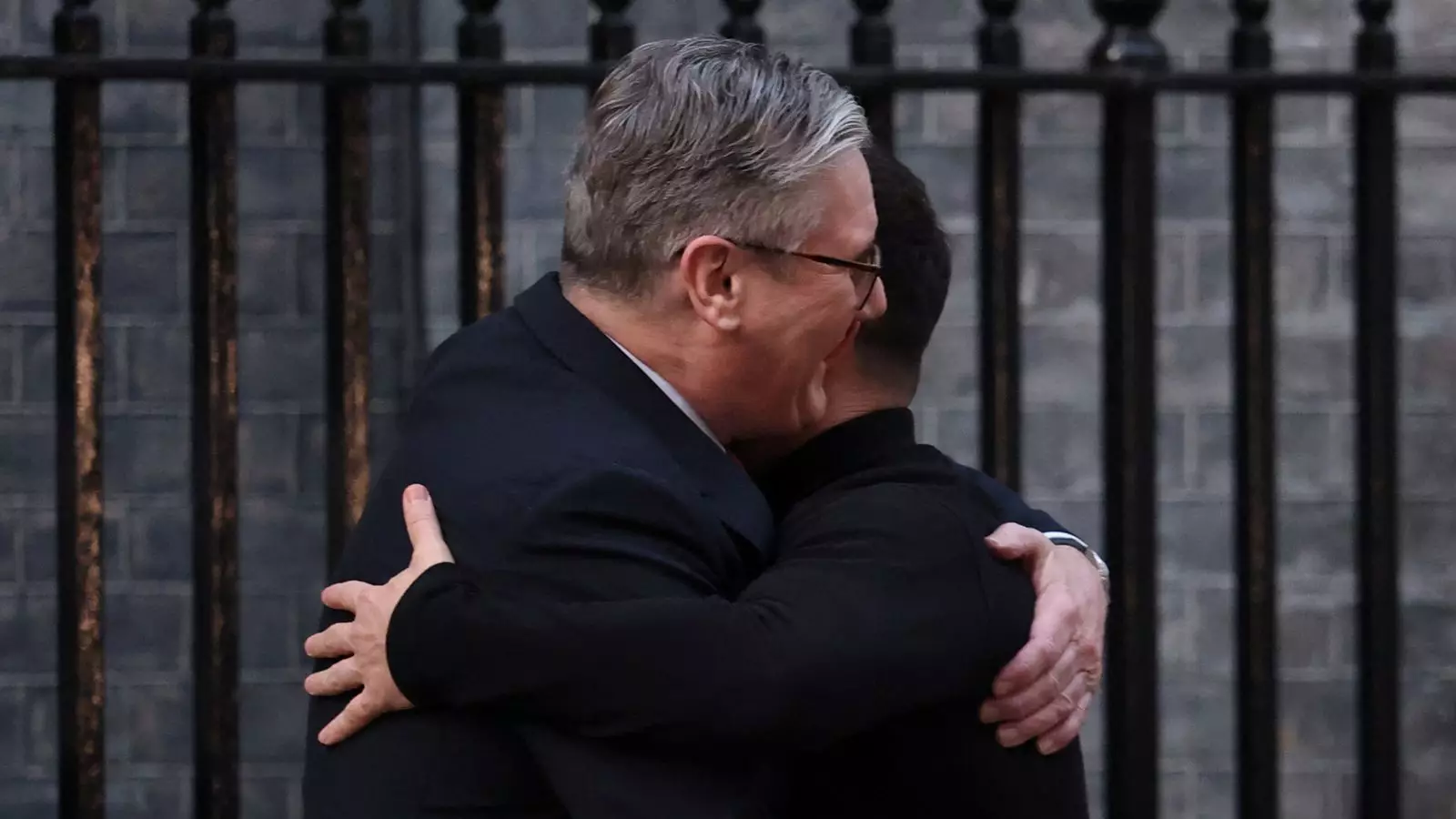When Ukrainian President Volodymyr Zelenskyy arrived at Downing Street, the scene was one of warmth and support. Sir Keir Starmer, the leader of the UK Labour Party, greeted him with not just a handshake but an embrace, symbolizing the solidarity of the United Kingdom with Ukraine in these tumultuous times. The exchange was upbeat; Zelenskyy appeared to lighten the burdens of his office, greeted by cheers and encouragement from onlookers outside. This display of camaraderie is especially noteworthy when considering the more tumultuous political waters both leaders are navigating.
Zelenskyy’s presence in the UK was not merely ceremonial; it marked a crucial phase in a series of diplomatic discussions aimed at reinforcing alliances and seeking decisive support as the war in Ukraine enters a precarious stage. Starmer’s statements reinforced the message that the UK remains steadfast in its support, pledging unwavering backing for as long as necessary.
The context of this visit was shaped by Zelenskyy’s recent encounter with former President Donald Trump, which had starkly different tones compared to the friendly atmosphere at Downing Street. In a rather heated exchange at the White House, tensions bubbled as Trump and his Vice President JD Vance confronted Zelenskyy aggressively. Their accusations—labeling him as “disrespectful” and “gambling with World War Three”—highlight the volatile environment he faces on the international stage. The contrasting receptions he received within such a short span underlines the complexities of diplomatic relations in times of war.
The combination of these interactions illustrates the broader geopolitical dynamics at play. While Starmer’s gestures and assurances indicated a united front, Trump’s combative stance reflected a growing rift in American politics regarding foreign aid and military involvement in Ukraine. Zelenskyy’s attempts to build consensus around a ceasefire also reveal how dire the situation remains, not just for his nation but for global peace.
Starmer’s comments about public support for Ukraine are telling. The cheers and support that Zelenskyy received on the streets encapsulate a sense of collective duty among British citizens towards Ukraine. This backing is crucial for legitimizing government action in the fight against Russian aggression. Starmer emphasized the importance of this grassroots support, indicating that the solidarity of the people enhances governmental resolve to provide consistent assistance.
Zelenskyy reciprocated the gratitude towards the UK people, emphasizing partnership and friendship. His remarks suggest an understanding that effective diplomacy often transcends official meetings and extends into the hearts of the citizens on both sides. Such support can prove vital not only in terms of military and financial assistance but also in ensuring the long-term commitment of allies in pursuing a resolution to the conflict.
Looking ahead, Zelenskyy’s agenda includes pivotal discussions with King Charles and participation in a major summit hosted by Starmer. This gathering is expected to assemble leaders from across Europe and the EU, strategizing on the trajectory of the war and outlining security measures for Europe at large. These conversations are likely to shape the response to ongoing challenges, revealing the intricacies of European solidarity.
The approach to negotiations around ceasefire agreements and mineral deals represents a balancing act. Zelenskyy recognizes the need to strengthen economic ties while navigating complicated military realities. The outcomes of these discussions could redefine international responses to the conflict, impacting not just Ukraine, but also influencing global security dynamics.
Zelenskyy’s visit to the UK is not an isolated diplomatic initiative but part of a broader strategy to ensure a united front in the face of adversity. As he engages with British officials and the public, the focus remains on building a comprehensive support network that can withstand the pressures of ongoing conflict. The warmth he received in Downing Street contrasted sharply with the tumult of his recent engagements, illustrating the multifaceted nature of global diplomacy in a time of crisis.
This interaction between Zelenskyy and British leadership serves as a reminder that amidst political strife, public sentiment and international solidarity can play powerful roles in shaping the narratives and outcomes of ongoing conflicts. The path toward peace may be fraught with challenges, but the commitment expressed by the UK government indicates that the collective resolve to support Ukraine remains strong.


Leave a Reply